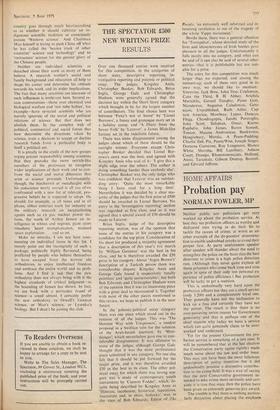THE SPECTATOR £500 NEW WRITING PRIZE RESULTS
There was some disagreement among the judges about which of these should be the outright winner. Everyone except Chris- topher Booker decided that Lionel Bur- rows's story was the best, and agreed with Kingsley Amis who said of it : 'I give this a slight edge over the others. The author is doing something harder than anybody else'. Christopher Booker was the only judge who was confident that Lezaver was an outstan- ding entry : 'Quite the most remarkable thing I have read for a long time'. Nevertheless it was decided by a clear ma- jority of the judges that the first prize of £500 should be awarded to Lionel Burrows. No entry in the 'investigative reporting' section was regarded as first class. and so it was agreed that a special award of £50 should be made to Lezaver.
Brian Inglis, judge of the descriptive reporting section, was of the opinion that none of the entries in his category was a candidate for the top prize. Consideration of his short list produced a majority agreement that a description of this year's TUC march by 'William Geminus' was the best in his class, and he is therefore awarded the £50 prize in his category. About 'Argos Brown's' description of a Turkish prison there was considerable dispute. Kingsley Amis and George Gale found it respectively 'totally pointless' and 'quite unmemorable'; but both Bob Edwards and Christopher Hudson were of the opinion that it was an interesting piece with a great deal to recommend it. Together with most of the other pieces mentioned in this review, we hope to publish it in the near future.
In the polemic/political essay category there was one piece which stood out in the opinion of all the judges. This was 'The Shortest Way with Trespassers'. a modest proposal in a Swiftian vein for the solution of the Arab-Israeli question, by 'Mun- dungus', which nevertheless gave rise to con- siderable disagreement. It was offensive to some of the judges, although George Gale thought that it was the most professional piece submitted in any category. No one else felt that it should be put forward for the major prize, and it was therefore awarded £50 as the best in its class. The other pol- itical essay for which there was strong sup- port was .a study of contemporary youth movements by 'Cannon Fodder', which, de- spite being described by Kingsley Antis as 'illiterate, incoherent, hysterical, repetitious, inaccurate and, in short. bollocks'. was, in the vie,w of Bob Edwards, Editor of ,The People, 'an extremely well informed and in- teresting revelation to me of the tragedy of the whole Yippy movement.'
Beside these, there was a general affection for `Trompalan', whose detailed study of the lives and idiosyncrasies of Irish beetles gave pleasure to all the judges. Unfortunately it falls neatly into no category, and what can be said of it can also be said of several other entries—that it is publishable but not suit- able for a prize.
The entry for this competition was much larger than we expected, and among the runners-up, each of them very good in its own way, we should like to mention: Vitruvius, Jack Bose, John Doe, Craftsman, Cato the Third, B. H. Abbey, Artchila Murtchila, Gerard Templar, Pieter Gott, Nicodemus, Augustus Caledonius, Gera- nium, Unpublished. Ruth Adler, Cap- tain America, Mowbray, Lupus. Duncan, Flegg, Chandragupta, Jacobi Persiviglio, John Scott, Salopian, Omar, Karoo, Euphel ht. John James, Baron Samedi, Tosson. Marcus Andronicus, Bookworm, Hengistbury, Merula, A Pease-Pudding, Charlie Zed, Pix, PennyWise, Joseph Singer, Doreena Gunstone, Roy Longmore, Blanco White, Shaysha, Bill Lansbury, Ashton Court, Drongo, Rhumwowmaiala, Holland, Assisi, Tarantula, Gibson Dunlop, Boswell, and Edward Jeffress.


































 Previous page
Previous page